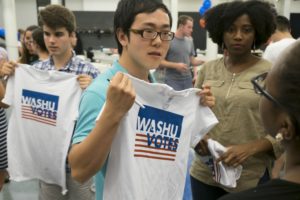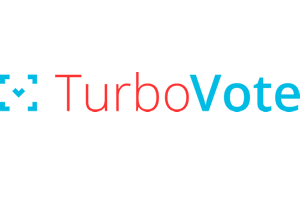
True or false: Registering to vote takes forever.
False: The process takes all of 10 minutes.
True or false: Students need only to register once.
False again. Students must re-register anytime they move, even it’s just from the South 40 to the Village.
True or false: Washington University in St. Louis has registered more voters with TurboVote than all but two other universities.
True. Through Sept. 26, 2,065 students had registered using TurboVote. And thousands more had registered online or in their home states.
“There are a lot of myths about voting, including the persistent narrative that young people can’t be bothered to vote,” said Cassie Klosterman, voter engagement fellow at the Gephardt Institute for Civic and Community Engagement and a 2016 graduate in Arts & Sciences. “That is not true at Washington University. Students here are not only registering to vote, they are engaging in the issues.”
 Washington University is one of some 200 university’s using TurboVote, an electronic registration platform that allows students to register in any of the nation’s 50 states or the District of Columbia. The process is fast and private. TurboVote only shares with the university the total number of students who register, and it sends students election reminders and alerts. So far, only Miami Dade College and the University of Maryland have registered more voters that Washington University.
Washington University is one of some 200 university’s using TurboVote, an electronic registration platform that allows students to register in any of the nation’s 50 states or the District of Columbia. The process is fast and private. TurboVote only shares with the university the total number of students who register, and it sends students election reminders and alerts. So far, only Miami Dade College and the University of Maryland have registered more voters that Washington University.
Students will have another opportunity to register as a voter from 11 a.m. to 2 p.m. Tuesday, Sept. 27, during National Voter Registration Day in front of the Danforth University Center. Students from WashU Votes, the Gephardt Center’s voter registration initiative, will be out in force.
“TurboVote makes it simple and eliminates the risk of error,” said Stephanie Kurtzman, interim executive director of the Gephardt Institute for Civic and Community Engagement. “In the past, if someone incorrectly filled out the paper form or it was somehow misplaced, students would show up at the polls and be surprised to find out they weren’t registered for that polling place.”
Klosterman has set ambitious goals for both student registration and turnout this election. In 2012, some 72 percent of Washington University’s 13,600 students registered, and some 56 percent of those students voted. Students with especially high turnout rates were South 40 residents who were registered in Missouri (84 percent), and Village residents who were registered in Missouri (95 percent).
Klosterman hopes to increase the voter registration rate to 80 percent and to boost the registered student voting rate to 65 percent. Civic dialogue, research shows, is the one proven way to get more people to the polls, Klosterman said. That’s why the Gephardt Institute will be hosting 90-minute post-debate civic dialogues after every debate.
“This will be a great way for students to engage in positive, respectful conversations,” Klosterman said. “When voters feel like they know and understand the issues, they are more inclined to vote.”
The ultimate goal, however, is not just high turnout rate on Election Day Nov. 8, but high turnout in years to come.
“Our focus is broadly on voter engagement, not just voter registration,” Kurtzman said. “When students start to identify themselves as voters — not just a supporter of a particular candidate or issue — that’s when voting becomes a part of their civic life.”